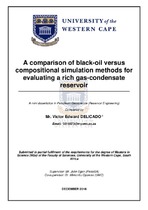| dc.contributor.advisor | Egan, John | |
| dc.contributor.advisor | Opuwari, Mimonitu | |
| dc.contributor.author | Delicado, Victor Edward | |
| dc.date.accessioned | 2018-04-03T10:27:28Z | |
| dc.date.available | 2018-04-03T10:27:28Z | |
| dc.date.issued | 2016 | |
| dc.identifier.uri | http://hdl.handle.net/11394/5860 | |
| dc.description | Magister Scientiae - MSc | |
| dc.description.abstract | Over time, researchers have endeavoured to use conventional black-oil (BO) models to
model volatile-oil and gas-condensate reservoirs as accurately as possible, with variable
levels of success. The black-oil approach allows for the implementation of a simpler and
less expensive computational algorithm than that associated with a compositional model.
The first-mentioned can result in substantial time-saving in full field studies. This project
evaluates the use of modified black-oil (MBO) as well as compositional (equation of state-
EOS) approaches to determine the expected recovery and performance of a rich gascondensate
reservoir. After initialization, the models reflected very similar in-place
hydrocarbon volumes, with a deviation percentage of less than 5 % between the two
modelling approaches. | |
| dc.language.iso | en | |
| dc.publisher | University of the Western Cape | |
| dc.title | A comparison of black-oil versus compositional simulation methods for evaluating a rich gas-condensate reservoir | |
| dc.rights.holder | University of the Western Cape | |

